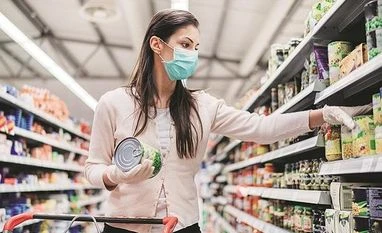Fast-moving consumer goods (FMCG) companies expect to deliver strong revenue and volume growth numbers for the quarter ended March 31, 2021 (Q4), driven by a low base and healthy demand trends across categories.
However, commodity inflation remains a concern, updates by firms in the last one week indicate.
Marico, Godrej Consumer (GCPL) and Titan have all released their quarterly updates for Q4, saying they expect strong double-digit volume and revenue growth for the period. But operating margins are expected to fall significantly due to input cost pressures, hitting bottomline growth.
"We expect to deliver low double-digit bottomline growth in Q4, as operating margins are likely to dip significantly due to input cost pressures," Marico said in its quarterly update.
GCPL said that it had taken calibrated price increases in Q4 to mitigate commodity inflation.
While crude oil price has slipped 10 per cent in a month to under $63 a barrel, agri-commodities such as palm oil, copra and tea have remained firm as global supplies continue to be tight.
Palm oil is used to make soaps, while copra is used to make coconut oil. On the other hand, a number of crude-linked derivatives are important inputs for FMCGs including linear alkyl benzene (LAB) and high-density polyethylene (HDPE).
LAB is used in making detergents and constitutes around 60-70 per cent of the latter’s input cost. HDPE is used in packaging material for all essential consumer items from soaps to detergents, hair oils, creams, shampoos and toothpastes. Packaging costs of these products constitute 15-20 per cent of overall production cost for companies.
FMCG firms have quietly increased product prices between 5 and 7 per cent over the last few months to mitigate input cost pressures. In tea, the price hikes have been even sharper, as much as 10-15 per cent, sector experts said, as firms fight to contain commodity inflation.
Yet, analysts say that this may not be enough as input cost pressures remain high. "Pricing action will remain benign as companies adjust to realities such as rising Covid-19 infections and its impact on sentiment. Companies will not want to hurt demand by increasing prices significantly at this point," G Chokkalingam, founder and managing director, Equinomics Research and Advisory, said.
Companies endorse this view.
"I don't think firms, whether in food or non-food, can take sharp price hikes. While demand in rural areas remains robust, purchasing power is limited in the hinterlands. Urban areas, on the other hand, are seeing a surge in Covid-19 infections. Firms will be circumspect when hiking product prices," Mayank Shah, senior category head, Parle Products, said.
Analysts expect the focus on essential categories to grow amid increasing lockdown curbs, a trend that was visible last year during the nationwide lockdown.
At the same time, in-home consumption will rise as people remain home-bound, pushing up growth of packaged foods and staples. Personal care and out-of-home categories, on the other hand, will take a hit, sector analysts said.
On Sunday, India crossed the 1.5-lakh-mark in daily Covid-19 cases, with states such as Maharashtra, Karnataka, Uttar Pradesh and Kerala contributing to bulk of the case load. Maharashtra, the worst-hit state, has already put stringent curbs in place to curtail the spread of the virus, including a weekend lockdown, closure of non-essential retail stores and night curfew.
Unlock 30+ premium stories daily hand-picked by our editors, across devices on browser and app.
Pick your 5 favourite companies, get a daily email with all news updates on them.
Full access to our intuitive epaper - clip, save, share articles from any device; newspaper archives from 2006.
Preferential invites to Business Standard events.
Curated newsletters on markets, personal finance, policy & politics, start-ups, technology, and more.
)